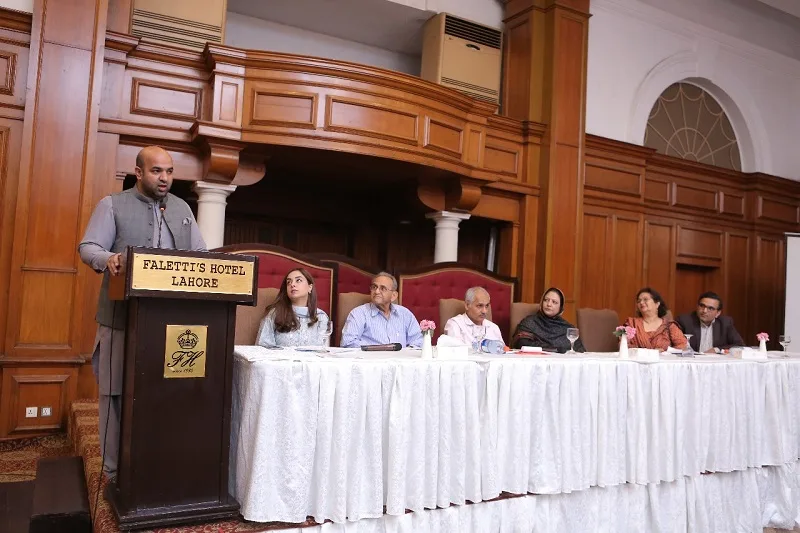LAHORE, Pakistan: The Centre for Social Justice (CSJ) and Peoples Commission for Minorities Rights (PCMR) organized a Conference on “Fulfilling the Dream of Free & Compulsory Education (Article 25-A of the constitution of Pakistan)”.
In the conference, speakers urged the government to engage relevant stakeholders, including independent education policy experts in policy-making process to develop comprehensive education policy that addresses education-related issues.
Peter Jacob, Dr. A. H. Nayyar, Dr. Baela Raza Jamil, Dr. Riaz Ahmed Shaikh, Dr. Yaqoob Khan Bangash, Saqib Jillani Advocate, Raza Ali Advocate, Dr. Uzma Ashiq Khan, Abida Mukhtar, Faaria Khan, and Shafaq Minhas were among the speakers while the provincial minister for school education Punjab, Rana Sikander Hayat also addressed the conference.
Speaking on the occasion, the Education Minister Rana Sikander Hayat said that the government is committed to investing more funds in education, which will be used to improve the quality of early childhood education, enhance access to technology in schools, and elevate the standard of teachers training. He reiterated that the Ministry of Education will empower school management councils to effectively address education-related issues, and introduce reforms to promote social cohesion and ensure equal learning opportunities for all students.
The Executive Director at CSJ Peter Jacob highlighted the challenges stemming from institutional disconnect and policy vacuum caused by a lack of coherence in policy decisions and a lack of coordination among relevant public bodies. He acknowledged the announcement of an education emergency and emphasized the need for clear strategies and measures to address the barriers and gaps in achieving the goal of inclusive and equitable quality education. He observed that the involvement of relevant stakeholders including independent experts in education policy and human rights is crucial in developing goals, targets, and actions for the upcoming education policy.
Dr. Baela Raza Jamil expressed concern over the learning loss experienced by children in Pakistan, attributing to inadequate funding provided by duty bearers, and the lack of approval of rules of business, which hampers the implementation of federal and provincial laws related to the right to free and compulsory education guaranteed in Article 25-A of the constitution of Pakistan. She said that the government needs to prioritize early childhood education to improve learning outcomes and language skills among children, and stressed engaging authentic stakeholders in the policy-making process to develop genuine solutions tailored to address education-related issues within the specific context.
Dr. A. H. Nayyar stated that a predominant religion-specific content is present in textbooks that promotes a certain ideology which is a violation of Article 22 (1) of the Constitution of Pakistan. He said that the government needs to abolish textbook boards, and offer multiple textbooks from private publishers to enhance the quality of learning, teaching, and examination, which would foster critical thinking and creative writing skills among students and teachers.
Dr. Riaz Ahmed Shaikh said that the quality of education suffers due to a lack of harmony in policy goals and policy actions introduced to influence the worldview of our nation. He lamented that the inadequate allocation of resources for education and non-scientific educational culture contributes to the decline in education standards. He emphasized the reversal of regressive policy decisions to bring the focus back on fact-based quality content in textbooks to promote a more balanced and informed educational curriculum
Dr. Yaqoob Khan Bangash emphasized the importance of imparting education in the right manner, cautioning that low-quality education can be more detrimental than receiving no education at all. He expressed concerns about the promotion of certain ideologies in textbooks noting that this compromises the overall quality of education. He underscored the need to transfer the responsibility of education to universities by abolishing the examination boards, which would ultimately lead to significant improvements in the education system in the long run.
Saqib Jilani Advocate underscored the government’s obligation to provide free education, including textbooks, transportation, meals, and stipends to prevent children from engaging in child labor. He announced that he intends to file a petition in the Supreme Court under Article 184 (3) to ensure the implementation of the fundamental right to education, guaranteed in Article 25 (A) of the constitution of Pakistan.
Raza Ali Advocate said that the single national curriculum (SNC) is a craft of the National Curriculum Council (NCC), which lacks legal authority, instead, the Council of Common Interest (CCI) is authorized to make such decisions under the 18th Amendment to the constitution of Pakistan. He highlighted an ongoing petition in Lahore High Court, that challenged the SNC, an extra-constitutional policy decision made by a non-statutory body, NCC.
Abida Mukhtar expressed concerns voiced by the parents of children regarding the single national curriculum, and the religious material in all textbooks particularly due to the involvement of the Punjab Ulema Board (PUB) in approving textbook content published by Punjab Curriculum and Textbook Boards. She mentioned that the parents filed a petition in the Lahore High Court challenging the regressive and unconstitutional policy decision to assert their children’s right to quality education.
Shafaq Mihnas shared the findings of the content analysis based on 130 textbooks published by federal and provincial boards that carry texts and images specific to a majority religion in books of all subjects including languages and social studies, and portray males and females in culturally assigned conventional roles.
